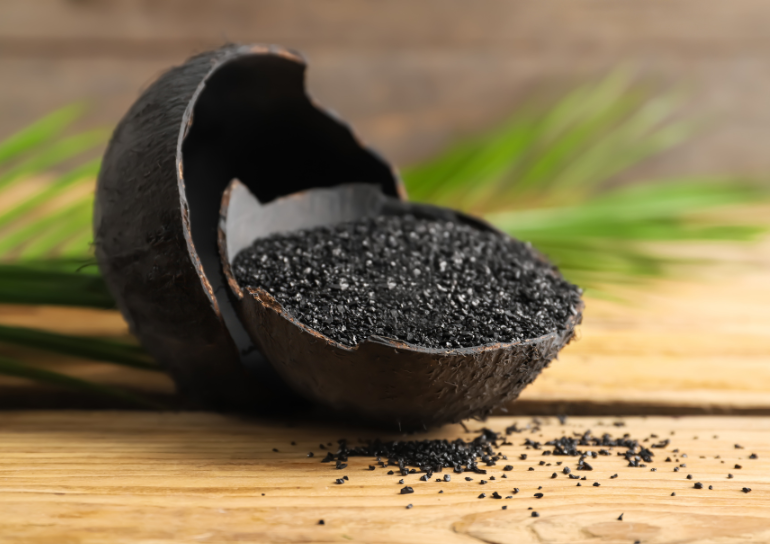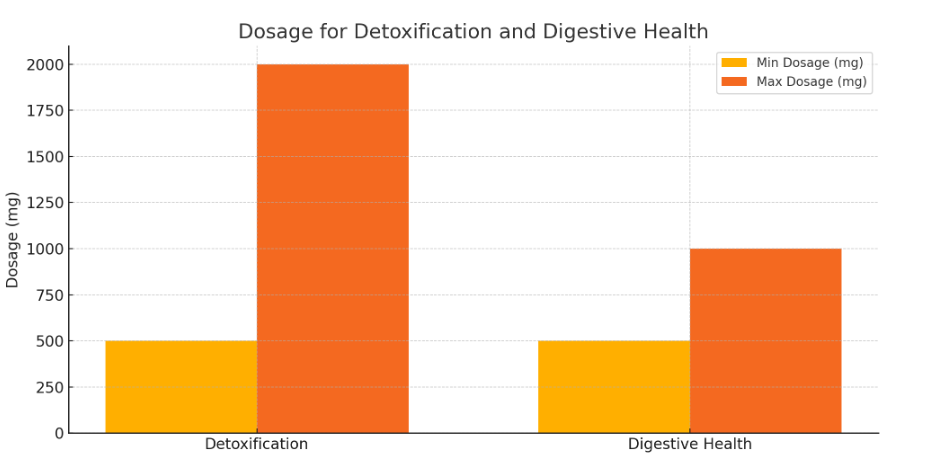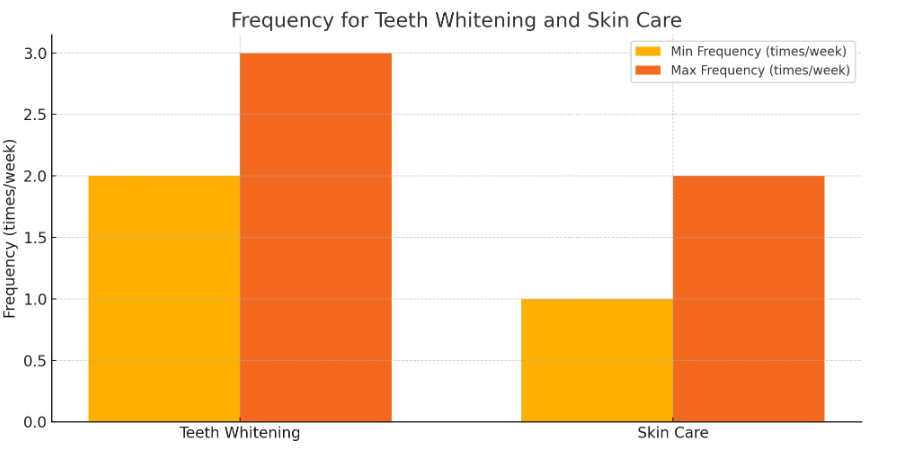
Charcoal is a lightweight, black residue that is produced by heating organic material like wood, peat, or coconut shells in the absence of oxygen. This process is called pyrolysis. Charcoal can be derived from a variety of organic materials, including wood, bamboo, and coconut shells.
Coconut Charcoal is made from the shells of coconuts - a natural and eco-friendly source. It's known for being super absorbent and works great for detoxifying the body, purifying water, and even in skincare. Plus, it's sustainable - turning a waste product into something useful!
Activated coconut charcoal is like regular coconut charcoal but supercharged! It's heated at high temperatures to make it extra porous, meaning it can trap toxins, chemicals, and impurities much more effectively. Whether for detox, filtering water, or clearer skin, activated charcoal is a powerful, natural purifier.
Miduty's Activated Charcoal stands out as a green, environmentally friendly option made from coconut shells. This source provides50% more micropores than coal-based activated carbon, significantly enhancing its ability to bind and remove toxins.
The superior porosity allows Miduty's charcoal to effectively attract and eliminate positively charged toxins that cause oxidative damage in the body.
Additionally, formed from vegetable cellulose, activated charcoal aids in restoring intestinal barrier function, making it an excellent choice for detoxification and digestive health. With Miduty, you get a high-quality, sustainable product that supports your overall well-being.
|
Uses & Benefits |
Description |
|
Detoxification |
Coconut charcoal is renowned for its ability to absorb toxins and impurities in the body. It is commonly used in detoxifying treatments and to support gastrointestinal health by binding to toxins and helping to remove them from the digestive system. [1] |
|
Digestive Health |
It can help alleviate symptoms of gas and bloating by binding to the gases in the gut. This makes it a popular remedy for digestive discomfort and upset stomachs. [2] |
|
Teeth Whitening |
The charcoal's abrasive nature helps to remove surface stains on teeth, leading to a brighter smile. It can also aid in maintaining overall oral hygiene by reducing bacteria in the mouth. [3] |
|
Skin Care |
In skincare, activated charcoal is used to cleanse and purify the skin. It is often found in face masks and cleansers where it helps to draw out impurities and excess oil from the pores. [4] |
|
Emergency Poisoning Treatment |
In medical emergencies, activated charcoal can be administered to patients who have ingested certain poisons or drugs. It works by adsorbing the toxins, preventing them from being absorbed into the bloodstream. [5] |
|
Reduces Jet Lag |
Activated charcoal may help with jet lag by binding to toxins and reducing fatigue-related symptoms. Its detoxifying properties can support the body's recovery, aiding in a smoother adjustment to new time zones. [6] |
|
Alcohol Detox |
Activated charcoal absorbs alcohol-related toxins, helping the body eliminate them. It may prevent some alcohol from being absorbed into the bloodstream. By removing toxins, it eases the burden on the liver during detox. [7] |
|
Anti Aging |
Activated charcoal binds to free radicals and environmental toxins, reducing cellular damage. It may help remove toxins that contribute to skin aging, reducing fine lines and blemishes. By eliminating harmful substances, it can support overall body health and slow aging processes. [8] |
|
Reduces Cholesterol |
It attaches to bile acids in the intestines, which contain cholesterol, preventing their reabsorption. Studies suggest it can help lower bad cholesterol (LDL) levels while maintaining good cholesterol (HDL). [9] |
|
Water Purification |
Activated charcoal removes harmful chemicals, heavy metals, and toxins from water by trapping them in its porous structure. It eliminates chlorine and other compounds that affect water's taste and smell. It also filters out pesticides, pharmaceutical residues, and microplastics, making water safer to drink. [10] |

How to Consume Activated Charcoal?
Take activated charcoal in capsule, powder, or tablet form, mixed with water. Ensure it's from a reputable source, and follow dosage instructions carefully. It's best to take it on an empty stomach to maximize absorption and avoid nutrient interference.
Dosage:

When to Consume Activated Charcoal?
Consume activated charcoal 1-2 hours before or after meals. Avoid using it with medications or supplements, as it may reduce their effectiveness. Use for detox or toxin exposure as needed, but don't consume daily without medical advice.
Frequency:
Constipation: Coconut charcoal can cause constipation because it binds to substances in the digestive system, including water. This reduces moisture in the intestines, making stools harder and more difficult to pass.
Interference with Medications: Can bind to medications, reducing their effectiveness. Take it several hours before or after other medications.
Start Slowly: Begin with a lower dose to see how your body reacts before gradually increasing the amount.
Stay Hydrated: Drink plenty of water throughout the day to support digestion and prevent dehydration.
Timing Matters: For best results, take activated charcoal at least 2-3 hours before or after meals and medications.
Use as Directed: Follow the instructions on the product label or the advice of a healthcare professional to ensure safe use.
Consult a Professional: If you have any pre-existing health conditions or are taking other medications, consult with a healthcare provider before starting activated charcoal.
Coconut charcoal, known for its potent adsorptive properties, offers numerous benefits from detoxification and digestive health to skin care and teeth whitening.
However, it's important to use it responsibly and be aware of potential side effects. Starting with lower doses, staying hydrated, and consulting with healthcare professionals can help you safely incorporate coconut charcoal into your wellness routine.
By following these guidelines, you can make the most of its natural benefits while minimizing any risks.
Coconut charcoal, also known as activated coconut charcoal, is commonly used for detoxification, digestive support, and gas relief. Its porous structure helps trap toxins, chemicals, and gases in the gut, making it popular for cleansing and digestive health.
Yes, coconut charcoal is beneficial for the skin due to its ability to draw out impurities, excess oil, and toxins from the pores. It's often used in face masks and cleansers to help reduce acne, blackheads, and improve overall skin clarity.
Activated coconut charcoal can be helpful for hair care by deeply cleansing the scalp, removing buildup, excess oil, and impurities. This creates a healthier scalp environment, which may support hair growth and help with issues like dandruff and itching.
The main difference lies in the source and quality: coconut charcoal is made from coconut shells and is more porous, making it better for detox and filtration. Regular charcoal is usually derived from wood and may contain more impurities. Coconut charcoal burns cleaner, longer, and produces less ash, making it a more eco-friendly and efficient option.
Coconut charcoal is generally safe for both internal and external use when taken responsibly. It's widely used for detox, skincare, and oral care, but it's important to follow recommended dosages and be mindful of possible side effects, especially with prolonged or frequent use.
| Sr. No. | Reference |
|---|---|
| 1. | |
| 2. | |
| 3. | |
| 4. | |
| 5. | |
| 6. | Authorised EU Health Claims for Activated Charcoal, Lactulose and Melatonin |
| 7. | |
| 8. | |
| 9. | |
| 10. | IVAn Evaluation of Activated Carbon for Drinking Water Treatment |
